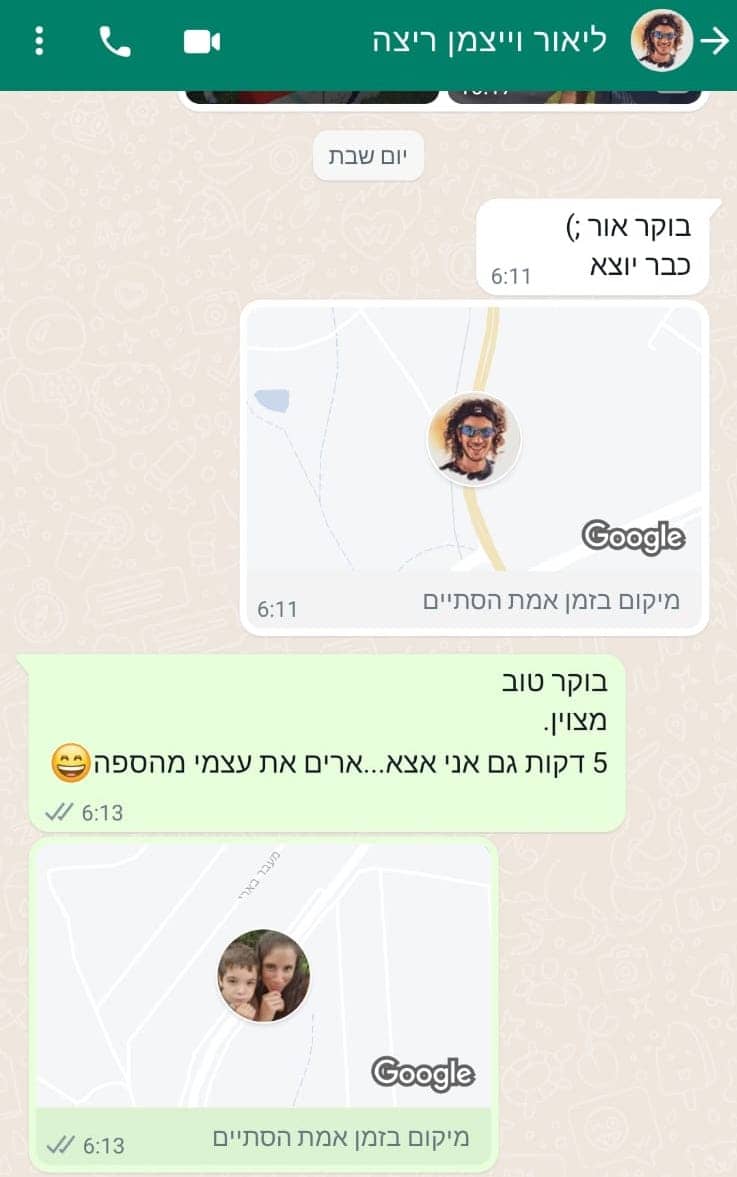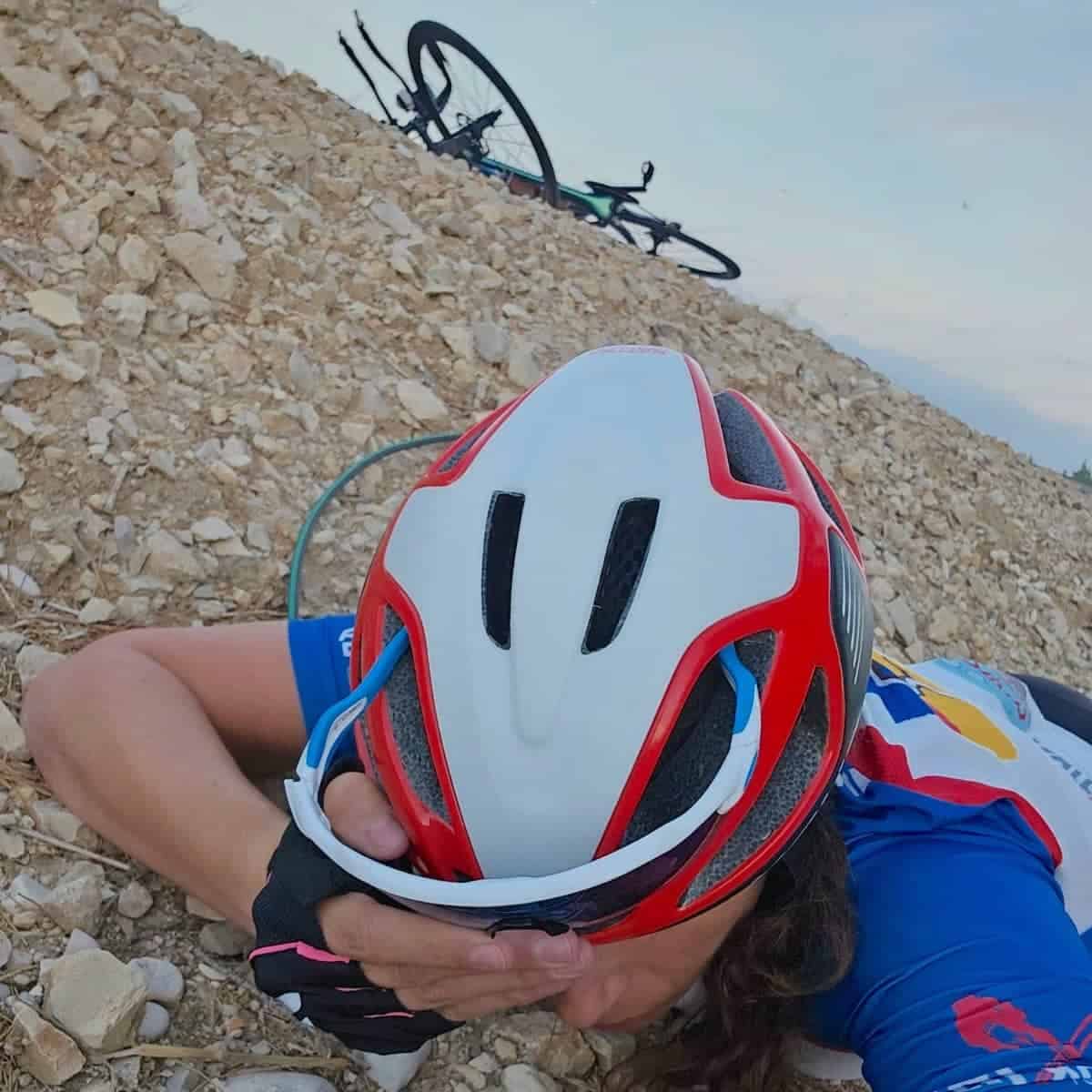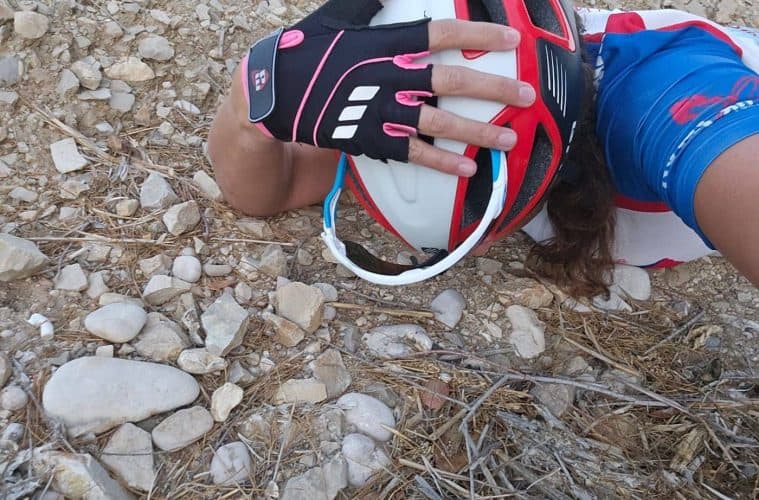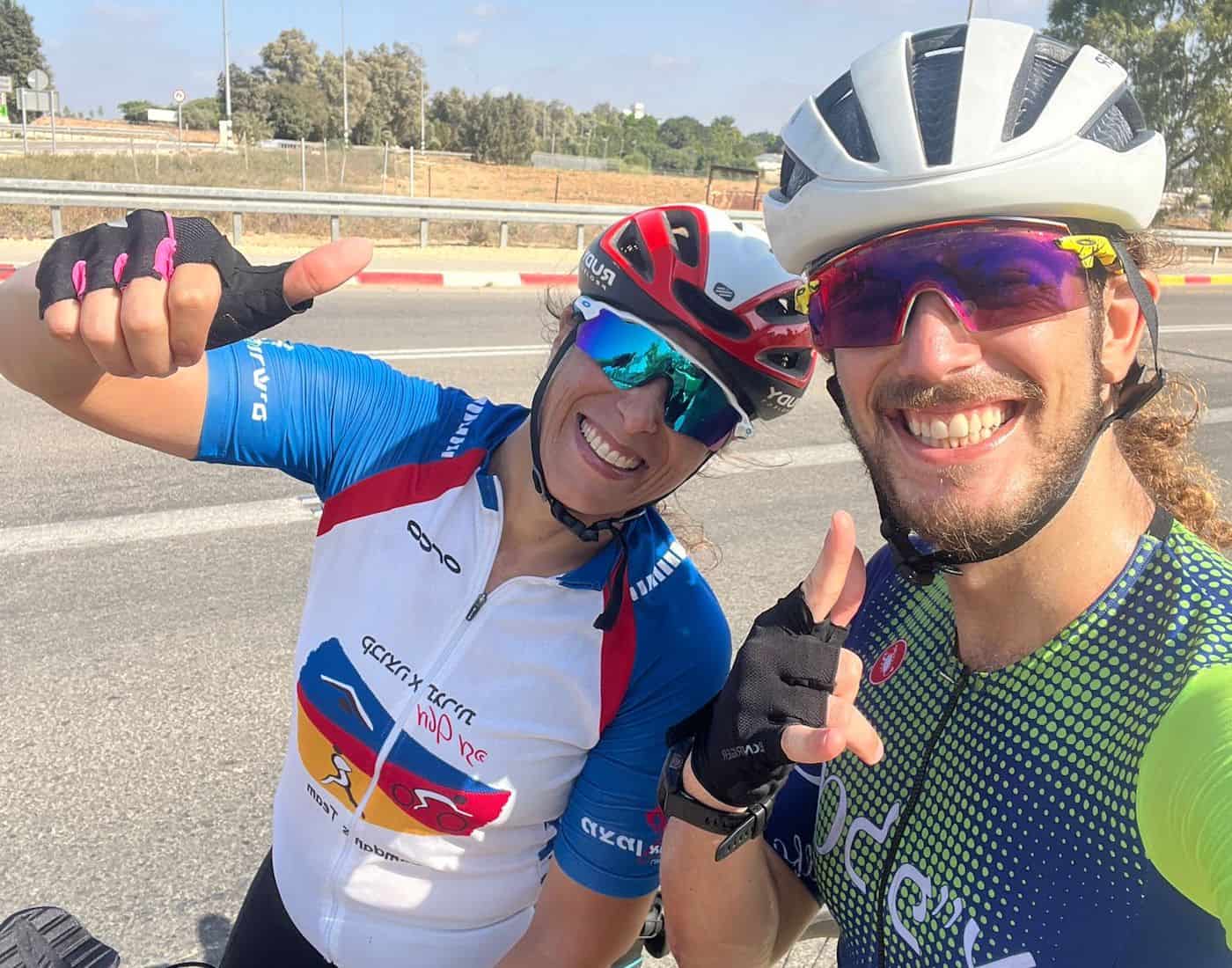It was a routine Saturday and I prepared for my weekly ride. I filled up my water bottles, pumped the tires and got ready to hit the road. Nothing was routine from that point on.
Lior and I planned to go out at first light, like on every other weekend ride. At 6:10 Lior texted me and shared his location. I put on my cycling shoes, started my Garmin, shared my location with Lior and left the house. At these hours the kibbutz (Be’eri) was still asleep. Everything was quiet and calm. I left the kibbutz and headed north. About 200 meters in, missiles started shrieking in the air. I got off my bike and lay down on the side of the road with my arms over my head. I called Lior and told him that there were rockets and to take care of himself. We decided that when it calms down we will go around and head home. Cars stopped by me, some drivers lay down besides me, some filmed the rockets on their phones. When things calmed down, I got on my bike and rode back the 200 meters towards the kibbutz junction in order to enter the roadside bomb shelter. People from a nature party nearby and cyclists who planned to go out for a ride in the nearby single tracks have arrived, and the shelter was crowded. I decided that at the first moment possible I would leave there, and head home.
 I got on my bike and started riding towards the kibbutz.
I got on my bike and started riding towards the kibbutz.
On the access road I saw three men running towards me. I recognized them; they were the Bedouin workers from our cafeteria, waving their hands and shouting something. At first, I didn’t understand what they were shouting, so I slowed down. They reached me, agitated, and told me there were terrorists in the kibbutz who had fired a rocket-propelled grenade and were looking for people to attack. The terrorists grabbed their car and phones and released them since they spoke Arabic and claimed to be Palestinians.
Without thinking twice, I let go of the bike and started running towards the junction. My cycling shoes hindered my movement, so I took them off at some point and continued running. One of the workers who was running with me said, “You can’t trust anyone. Let’s get a ride and get out of here.” We yelled out to the people at the junction that there were terrorists and they should run, but it seemed like they didn’t understand or hear us. We crossed to the other side of the road and tried to hitch a ride. No one stopped for us.
Then we saw that the cars that had passed us suddenly turned around, and one of the drivers yelled at us that there was shooting at the junctions and on the road. So, I decided to run towards Shokeda and from there to the single track roads. I know the area well, these are my riding routes. But then I got a text from my brother, letting me know that one of the cyclists from the kibbutz was shot exactly on the road where I had planned to escape, and I realized we were surrounded.
I realized that we were surrounded; we needed to hide in the bushes.
I told the guys who were with me that there was no escape, and we should hide in the thorny bushes. As we were , little caring whether there were thorns or not, we lay down under and among the thorns. Silently. Barely able to breathe. Through my phone, he sent a message to his family to speak to the police or someone of his friends to come and rescue us.
We heard the terrorists on the road; they were riding motorcycles, cars, quads, tractors with plows. Helicopters were flying in the sky. Gunshots, red smoke in every direction, a strong shock wave from something that exploded right next to us. I now know that a grenade was tossed into the bomb shelter where I had been standing just a moment ago, and killed the people inside. The smell of fire filled the air. All kinds of rockets and shells passed by us and above us, and I knew we couldn’t get up.
Every hour, I sent a message to my husband, Omri, letting him know they hadn’t killed me yet. From the WhatsApp messages in the kibbutz group, I understood everything that was going on, and I prayed that the terrorists wouldn’t get into our house and that my family would be safe. All the thoughts in the world raced through my mind at that moment, but I tried to calm myself and not give in to stress. Many breathing exercises. Turning from my stomach to my back due to the explosions and gunshots around us. I wore my bike helmet for protection, and removed the shades, to prevent the glare from giving my position away. 7-8 hours later, the Bedouin friends who came to rescue us sent a photo showing they were right next to us and called us to come out. We ran towards the car, and the journey to safety began.
 The Bedouins from the nearby city Rahat rescued me.
The Bedouins from the nearby city Rahat rescued me.
At this stage, many army units were searching the area, and they yelled at our car to stop since they saw Arab looking people in the car (at this stage, they no longer distinguished between Israelis and Hamas terrorists). We quickly got out of the car and screamed at the soldiers not to shoot. The soldiers approached us cautiously and asked for identification. When they saw me, they suspected I was abducted.
At this point, I collapsed on the ground. I couldn’t stand up and just cried. They asked if I was injured, and I told them I wasn’t and asked them to get us out of there. The soldiers understood that there was no real danger. We hopped into their car, along with two other guys who hid in the bushes. They asked us to go to the gathering point in Patish.
The Bedouins are people of the land. They know the area well and knew exactly where to go. Along the way, we saw abandoned and burnt cars, and ruins with no signs of life. The horizon towards the Gaza border communities was full of smoke and seemed entirely destroyed. Terrorists were detained at intersections, blindfolded, next to large military forces who apprehended them.
We reached Patish, and from there, we went to the Ofakim police station. Many people who survived the massacre in the rave event that took place in the region were gathered there. Some were silent, some were in shock. Everyone was covered in dust and sand because they had laid on the ground, each with their own terrifying story. Sirens sounded, and information about a group of terrorists roaming around Ofakim was causing unrest. They placed me in a shelter, and I couldn’t get out for a long time.
My cousin and my nephew were killed.
At this point, I had already made contact with my brothers. I was told that my cousin and my nephew were killed. My brother and my niece were wounded and were taken to the hospital. I also managed to talk to my mom at this stage and then completely fell apart. I sat and cried endlessly, tears of a shattered heart that still couldn’t grasp the magnitude of the disaster and how fortunate I have been.
One of the police officers told me that there is a bus taking everyone to Be’er Sheva, and I must go because they can’t leave anyone in Ofakim, it’s too dangerous. I got a call from the cafeteria manager, telling me that he is coming to take care of me. He will take me wherever I want.
I told him I am on the bus to Be’er Sheva. He said he is behind the bus, and the moment I get off, I should get in his car, which I did. On the way they bought me food and drinks. Omri’s father was waiting in Kiryat Gat because we didn’t want him to get close to the conflict area. We met him, and I moved over to his car, and we drove to Kfar Hanagid.
Lior Weizman was killed while riding his bike.
I got to know Lior when we started organizing a group for a mountain to valley stage race. He joined the group as if he had always been there. He was new to the world of triathlons and had a lot of questions. He was training for the Ironman competition so we trained together. Lior started a WhatsApp group with riders from the area to coordinate longer and longer rides in preparation for the competition. We did the Ashkelon and Ashdod triathlons together. We would wait for each other to track results, and during the Saturday rides, we would talk and laugh. Lior had a great sense of humor, and there was always a smile on his face.
After the Ashdod triathlon, when I was on the podium and Lior took a picture of me, he asked when he would also stand on a podium. I told him that based on what I know about him and his determination, we would surely see him on many podiums. Later, I learned that Lior, my partner in Saturday rides and competitions, was shot and killed entering Sderot. It is a huge loss for all of us.
We reached my in-laws home, and I collapsed.
I felt ill, like I was about to faint. We called for an ambulance, and they took my vitals and said that physically I was fine. Therefore, I decided not to go to the hospital despite their recommendation. I opened my eyes and heard gunshots and sounds of war. I couldn’t calm down. I kept checking the kibbutz’s messages to see if they managed to evacuate Omri and the kids. Only the next morning, they succeeded in getting Omri and the kids out through a window because the door was jammed, and they came to me.
The bikes saved my life and prevented me from being in the kibbutz at the time of the massacre, and Omri’s life too, as he was planning on going out with the emergency squad, most of whom didn’t make it back.
My parents were only released much later because there were many fire exchanges, but they were also saved unharmed. My brother underwent two surgeries, and they will likely amputate his injured leg, which lost a lot of blood. My niece had an operation to remove shrapnel from her legs, but she is fine. Through a WhatsApp group for Kfar Hanagid, we managed to get clothes and shoes for all of us.
I break down from time to time but then gather myself for the sake of the children. I still hear gunshots sometimes in my head, but I work on calming myself. Now we are preparing to leave for the Dead Sea, where all the Beeri survivors are, because it’s best for the children to be with their friends.
As more and more information about the casualties and missing people reaches us, we know there is still a lot of missing information. Things won’t return to how they used to be. As a small anecdote of dark humor, my Garmin watch remains on my abandoned bike. So, if the security forces find the bike and the watch, they can end my activity. From now on, we have another activity to carry out: collecting the shrapnel and mending our broken hearts, which I doubt we will fully succeed. We are mostly shattered, broken, and in shock, falling apart from time to time, but then we gather strength for the children and are grateful for still being alive
Written by: Aya Meydan,
Runpanel.co.il
Share this article, with the buttons below:




